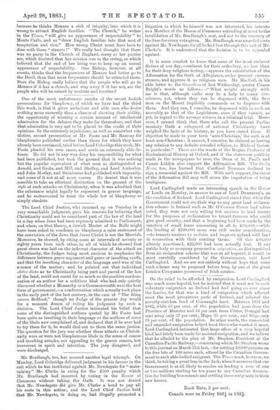The Lord Chief Justice, who summed up on Tuesday in
a -very remarkable judgment, gave his reasons for believing that -Christianity could not be considered part of the law of the land in a day when Jews had been expressly admitted to Parliament, -and when, on that theory, a Jewish Master of the Rolls might have been asked to condemn as blasphemy a calm statement of the conviction of the Jews that Jesus Christ is not the Messiah. Moreover, he showed, by citing cases at intervals of seventy or .eighty years from each other, in all of which he showed that great stress was laid on the indecent character of the attack on Christianity, the Judges being most anxious to emphasize the difference between grave argument and gross or insulting scoffs, and that the insulting character of the language used was of the -essence of the matter ; and he pointed out that individual obiter dicta as to Christianity being part and parcel of the law -of the land, could not count for so much as the positive condem- nation of an author for a seditious libel who had only quietly -discussed whether a Monarchy or a Commonwealth were the best form of government,—a condemnation which actually took place -in the early part of the last century, in the case of "The King versus Bedford," though no Judge of the present day would for a moment dream of ruling his judgment by such a decision. The Lord Chief Justice intimated his belief that some of the distinguished authors quoted by Mr. Foote had been quite as insulting in their language as the authors of some of the libels now complained of, and declared that if he ever had to try them for it, he would deal out to them the same justice. The question for the jury was whether these attacks on Christi- anity were or were not blasphemous libels in the sense of coarse and insulting attacks, not appealing to the graver reason, but irreverent in spirit and intention. The jury disagreed, and -were discharged.


































 Previous page
Previous page